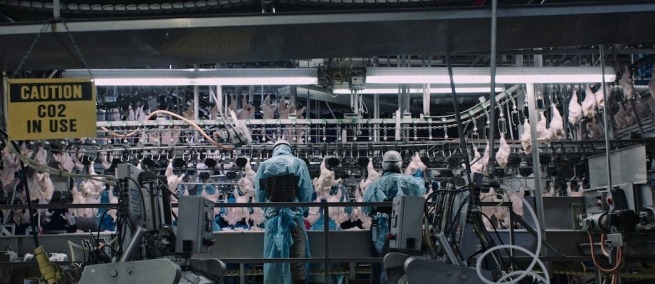
Officials from the United States Department of Agriculture and Food and Drug Administration insist that America has the safest food supply in the world. In her new film POISONED: THE DIRTY TRUTH ABOUT YOUR FOOD, director Stephanie Soechtig disputes this claim by examining the transferring of pathogens in food that has led to 48 million people in the U.S. getting foodborne illnesses annually. The film marks the latest chapter for the investigative documentarian having examined pollution in bottled water in TAPPED, obesity in FED UP, and perfluorooctanoic acid in THE DEVIL WE KNOW.
During her film’s world premiere at Tribeca 2023, Science & Film corresponded with Soechtig about the role of food in our lives, the cleanliness and care of transferring food and beverages, and the future of a healthy ecosystem.
S&F: What keeps you returning to this topic, exposing the ills of the U.S. food system and specifically, foodborne illnesses?
Stephanie Soechtig: Food is the great equalizer in many ways—we all eat! As consumers, we assume that the food on our shelves is safe. To learn that it is not safe and that there are ways to make it safe that are being ignored, that’s something people deserve to know.
S&F: It is sometimes hard to get advocates and government employees to be in a documentary due to the many required clearances and at times, the fear of backlash. How did you get officials such as USDA’s Sandra Eskin and FDA’s Frank Yiannas to be open on camera about this?
Stephanie Soechtig: I don't think I'd describe their appearance as ‘open.’ I think they gave us minimal time with many conditions and then delivered a bunch of government talking points. I believe both Ms. Eskin and Mr. Yiannis share the same grievances I have regarding the current state of the food industry, but they can't say that on camera. I find that incredibly sad. I think they are both good people who want meaningful change, and I wish that Ms. Eskin had been as frank in our interview as she was with ProPublica before she took office.
S&F: I was surprised and simultaneously unsurprised to learn from the film about the government’s role in the outbreak of foodborne illnesses as they regulate imports and exports. What were some surprises you’ve discovered along the way?
Stephanie Soechtig: If it's in the film, it’s because [it] was a surprise to me. There is a lot to list here, but one of the big shockers was the idea that selling salmonella-tainted chicken in this country is perfectly legal! Another massive surprise to me was the result from our own chicken testing. We definitely didn't see that coming.
S&F: While the technology in stoves and refrigerators has advanced, this issue still exists. What are the advantages and disadvantages of inserting our food into these appliances?
Stephanie Soechtig: The benefits are that our food has a longer shelf life, and we can potentially cook out pathogens. The disadvantages are that they've made us more complacent.
S&F: One of the first instincts that someone has about nutrition and heating instructions is trust the label, yet the FDA and USDA contribute to misleading labels. How much of the FDA and USDA influence do you see on a daily basis?
Stephanie Soechtig: Oh, my goodness—everywhere! From the so-called ‘food’ they feed our kids at school to the medications we take.
S&F: Whenever I receive new information about food contamination, I have to live with the possibility that I might get sick. How do you handle eating and drinking the same items after digesting new information about the problems of the U.S. food system?
Stephanie Soechtig: Well, I feel like I'm a much more informed consumer now and make much better choices. I stopped eating oysters. I am growing my own spinach and romaine now. I bought a food thermometer!
S&F: How do you imagine a future ecosystem where people do not have to worry about losing their life over food?
Stephanie Soechtig: When our government starts to put the interests of the people over the interests of corporations, we will all be a lot safer.
♦
TOPICS